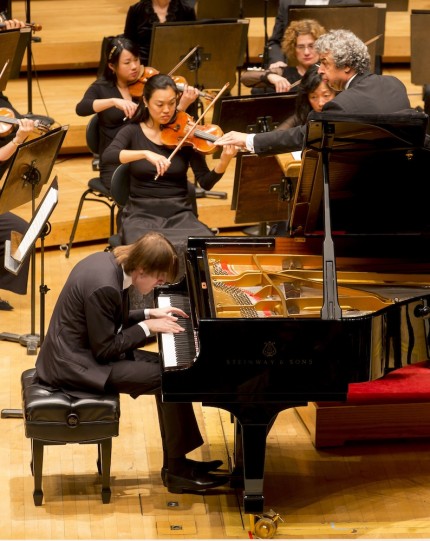Bychkov, Trifonov and CSO serve up a Russian night to remember

Semyon Bychkov led the Chicago Symphony Orchestra in a Russian program Thursday night that offered one rarity and one familiar work. Oddly, the rarity was by Rachmaninoff and the familiar work, Shostakovich.
Rachmaninoff’s Piano Concerto No. 1 is the least often heard of the composer’s five works for piano and orchestra. Written at age 17, and first performed by the composer at a student concert, the work was later revised substantially to the form we know it today.
The First Piano Concerto is less lushly melodic than Rachmaninoff’s other works in the genre. While it has a characteristic mix of whirlwind solo virtuosity and yearning lyricism—albeit in more streamlined form—the concerto also possesses a dark volatility and tense, nerve-wracked quality that often seem more closely aligned to Rachmaninoff’s ill-fated Symphony No. 1.
Having the remarkable Daniil Trifonov as soloist clearly helped put this neglected work in a positive light. Indeed, so compelling was the combustible advocacy put across by Trifonov, Bychkov and the orchestra that the leaner First Concerto seemed just as substantial and rewarding as its better-known successors.
At 24, Trifonov is already an artist of striking maturity. Blessed with a stupendous technique, he blazed through the bravura passages with daunting power and accuracy, the lightning virtuosity of his octaves and runs up the keyboard thrown off with bracing clarity and faultless articulation.
Yet what makes Trifonov so compelling a musician is his rarefied poetic sensibility. In the first-movement cadenza, the pianist played with rapt introspection and his free, flexible rubato in the Andante brought an intimate musing melancholy that was almost otherworldly. With equally energized support from Bychkov and the orchestra, Trifonov’s fire and speed in the finale built to a thrilling coda. The conductor drew refined and even elegant support for his young compatriot, firmly skirting soupiness and bombast.
The extended ovations brought Trifonov back on stage for an encore, Debussy’s “Reflets dans l’eau,” from Book I of Images—luminous, subtly shaded and floated with the greatest delicacy.
For a work once considered an odd and intractable work, Shostakovich’s Symphony No. 8 has enjoyed a high profile with the CSO, being performed eight times since Carlo Maria Giulini led the first CSO performance in 1974, including twice in the last five years and three times on tour.
Unlike the tub-thumping “Leningrad” symphony, the Symphony No. 8 seems as much about the internal Soviet terror within as the armed struggle without. Spanning five movements and over an hour, it is a dark, edgy and violent piece, with a finale that seems neither optimistic nor tragic, just equivocal as Soviet life plods on.
Bychkov clearly has the measure of this challenging work. In the long opening movement, the performance was notable for its restraint. Bychkov drew playing of a natural, organic quality with the subdued elegance of the long, ruminative string lines almost sounding more French than Russian. Yet the patience paid off in the jarring impact of the grinding militaristic climaxes, high winds favored in the balances to strident effect.
The mechanistic banality of the Allegretto was firmly etched, and the inhuman driving violence of the ensuing Allegro felt like a precursor to Shostakovich’s satiric portrait of Stalin in the Tenth Symphony. In the fast and rhythmically repetitive middle section with crazed trumpet calls, it’s hard not to feel that the composer is giving his politically pliant colleague Khachaturian a stiff uppercut as well. Bychkov artfully drew out a thematic resemblance near the end of the movement to the “Curse” motif from Wagner’s Ring in a way few have captured.
In this performance, the penultimate Largo proved a focal point, rendered with a numbed desolation. The limping finale didn’t provide much solace in this reading, though Bychkov’s calibrated terracing of the hushed final bars was aptly bleak and resigned.
The CSO musicians always play well for Bychkov and so it proved again Thursday night, as a corporate entity and individually. Scott Hostetler’s crucial English horn solo at the end of the first movement was the only slight disappointment—well played yet too present and matter of fact to convey the fragile voice in the wilderness Shostakovich was clearly aiming for.
Stellar contributions, however, were had from trumpet Christopher Martin, piccolo Jennifer Gunn, bassoonist William Buchman, clarinetist Stephen Williamson and guest hornist Nicole Cash from the San Francisco Symphony.
Forget the NFL draft. Those keeping score at home in the CSO’s weekly principal flute audition sweepstakes were rewarded Thursday night. Mark Sparks, principal of the St. Louis Symphony, brought a rich, focused tone and expressive eloquence to his solos that recalled the greatly missed Mathieu Dufour.
The program will be repeated 1:30 p.m. Friday, 8 p.m. Saturday and 7:30 p.m. Tuesday. cso.org; 312-294-3000.
Posted in Uncategorized

